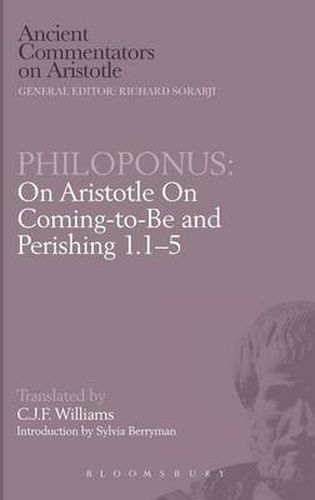Readings Newsletter
Become a Readings Member to make your shopping experience even easier.
Sign in or sign up for free!
You’re not far away from qualifying for FREE standard shipping within Australia
You’ve qualified for FREE standard shipping within Australia
The cart is loading…






The first five chapters of Aristotle’s De Generatione et Corruptione distinguish creation and destruction from mere qualitative change and from growth. They include a fascinating debate about the atomists’ analysis of creation and destruction as due to the rearrangement of indivisible atoms. Aristotle’s rival belief in the infinite divisibility of matter is explained and defended against the atomists’ powerful attack on infinite divisibility.
But what inspired Philoponus most in his commentary is the topic of organic growth. How does it take place without ingested matter getting into the same place as the growing body? And how is personal identity preserved, if our matter is always in flux, and our form depends on our matter? If we do not depend on the persistence of matter why are we not immortal? Analogous problems of identity arise also for inanimate beings.
Philoponus draws out a brief remark of Aristotle’s to show that cause need not be like effect. For example, what makes something hard may be cold, not hard. This goes against a persistent philosophical prejudice, but Philoponus makes it plausible that Aristotle recognized this truth.
These topics of identity over time and the principles of causation are still matters of intense discussion.
$9.00 standard shipping within Australia
FREE standard shipping within Australia for orders over $100.00
Express & International shipping calculated at checkout
The first five chapters of Aristotle’s De Generatione et Corruptione distinguish creation and destruction from mere qualitative change and from growth. They include a fascinating debate about the atomists’ analysis of creation and destruction as due to the rearrangement of indivisible atoms. Aristotle’s rival belief in the infinite divisibility of matter is explained and defended against the atomists’ powerful attack on infinite divisibility.
But what inspired Philoponus most in his commentary is the topic of organic growth. How does it take place without ingested matter getting into the same place as the growing body? And how is personal identity preserved, if our matter is always in flux, and our form depends on our matter? If we do not depend on the persistence of matter why are we not immortal? Analogous problems of identity arise also for inanimate beings.
Philoponus draws out a brief remark of Aristotle’s to show that cause need not be like effect. For example, what makes something hard may be cold, not hard. This goes against a persistent philosophical prejudice, but Philoponus makes it plausible that Aristotle recognized this truth.
These topics of identity over time and the principles of causation are still matters of intense discussion.